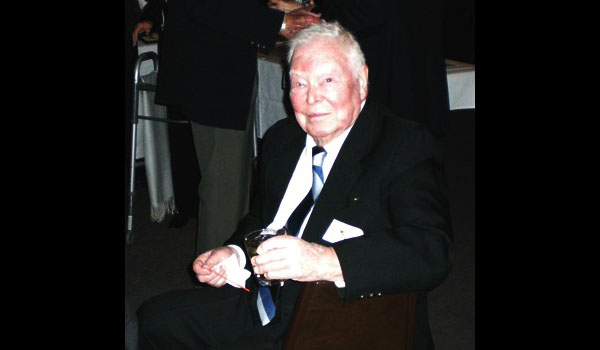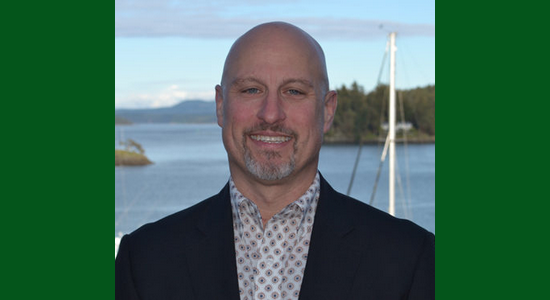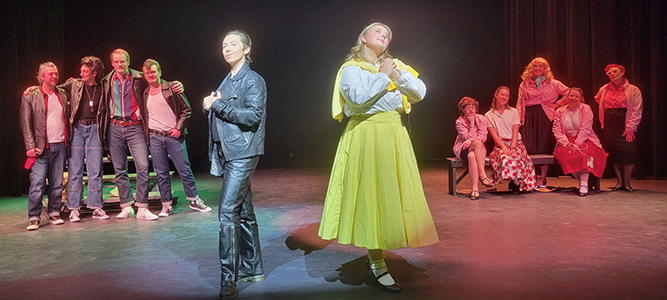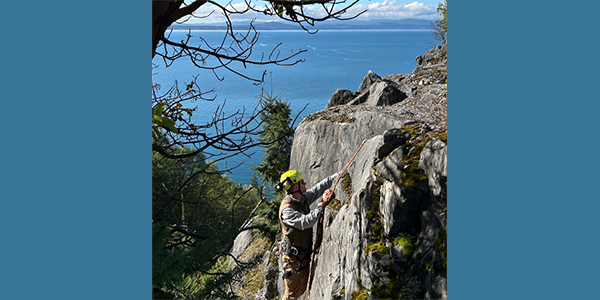||| FROM MARGIE DOYLE |||
Harry Patton told a good story, and his life was full of them — from flying fighter planes in World War II, making missile defense films, escorting the Secretary of Defense as he decided to ax the Dyna-soar project, conducting bombing raids to Waldron and Lummi islands, to his retirement to Orcas, where his family has had a home since the days of his grandfather, and where he continued to storytell while writing a book.
He lived at his cabin past Doe Bay until early 2020 when he moved to an assisted living facility in Burlington, where he passed away peacefully following many visits in quarantine from his family and friends.
His granddad, also named Harry Patton, was editor of Bellingham Herald when he first visited Orcas Island, crashing into the beach near Homestead Lane. The property owner, Robert Paternoste, moved to Bellingham to marry and sold Patton 36 acres and 2,000 feet of waterfront. The property was eventually split up among family members, and now Harry has eight acres and “a hunk of waterfront and a good little beach.”
At a meeting of the Naval Air Pilots Rendezvous in 2010, he received a refurbished wooden airplane propeller, the same model as the one used on a Stearman “Yellow Peril” biplane trained that he trained on in WW II.
Every year for over 45 years, he attended the Rendezvous with his old buddies. In 2010, only about 45 attended the event, including wives, out of the original 110 airmen. They kept up the jocular rivalry that has characterized all their meetings. Though some were in wheelchairs, they still joined in with relish to rib their fellow servicemen.
At the 2010 Rendezvous, Patton recalled the airplanes he used to fly with the Hartzell propeller. “Those planes were just about identical to the one Rod Magner flew,” Patton said. “Any pilot could do more in a Stearman than a Hellcat, because the Hellcat would come apart. In a regular plane you’d get killed doing an inverted spin.”
After training, Patton served in the South China Sea on the USS Independence, stationed off Saipan. He didn’t see much war action, and claims, “I’m not a hero,” but he recalls the night that he saw flying overhead the aircraft Enola Gay, along with navigation, photography and gunnery planes headed for Hiroshima with the atomic bombs that ended the war in the Pacific.
Patton returned to the northwest and graduated from the University of Washington in the late 40s with degrees in journalism and advertising. He also had two years of engineering courses under his belt.
He continued military service in the Navy Reserve program, serving one weekend a month in Seattle, flying four flights a weekend. He retired 27 years later as a full commander. Reserve training included maintaining competency in gunnery, rockets and bombs, and Patton recalls some of those test-bomb flights — to the south end of Lummi and Waldron Islands among them.
He also recalled a cruise to Guantanamo Bay in Cuba in 1958. The Naval Reservists were the only U.S. military presence – without rockets or bombs — as Fidel Castro revved up plans for his revolution. But the coup didn’t happen until the next year, by which time Patton was safe at home, working his ‘day job’ at Boeing. Patton’s job was to finalize sales of 727s and 737s, acting as an “attorney-in-fact.” He recalls pocketing a $22,00,0000 check one Friday afternoon, after the banks had closed for the weekend.
While at Boeing, Patton also wrote and produced top-secret movies about the progress of the BOMARC guided missile systems the defense branch of the company was developing. Patton was in his element. He said, “I just love to meet people and I was the kind of guy that could take an expert out to lunch and talk aviation, engineering, systems. They used me to give speeches and tours.”
One of those tours was a top-secret presentation as he escorted then-Secretary of Defense Robert McNamara through the Boeing plant’s Dyna-soar project. It was the beginning of design for space shuttles, but the two metals used in the wing shingles were not up to the vibration test, and would break, said Patton. McNamara needed to make a decision following the tour, and Harry was standing next to McNamara when he said, “as of today the program is canceled.”
The cancellation of the program in December 1963 threw Boeing and Seattle into a recession made famous by the local billboard asking, “Will the last person to leave Seattle turn out the lights?” Patton continued as a contract administrator and said that his career was “just interesting, not spectacular.”
He recalls the times during those days when he, his wife, five kids, babysitter and a dog would drive up from Seattle for the summer. Harry would commute to his job at Boeing and come back to Orcas every weekend with a car full of groceries.
In 1996, with his second wife Joan, Patton realized, “Seattle’s been great, but I hate I-5 – why don’t I move to Orcas, pull my head in and to hell with everybody?”
In recent years, he continued writing a memoir entitled “The Tiger and I,” about the funny things that happened in his squadron back during World War II.
“Once you join the navy you get separated [from the men you first train with], but this guy would always show up, and was always in trouble and I’d save his bacon,” Patton says. The book is for naval aviators to understand, remember and laugh.
Patton himself said that when he re-reads the book, “I laugh my head off … and I tell myself, ‘God you were a good writer!’”
Since 2000, Harry Patton was named Grand Marshall of the St. Patrick’s Day Parade and could be frequently seen at the American Legion Post where he regaled regulars with more stories and songs and opinions. He also kept up with his beloved Naval Air service, tracking recent events such as detailed environmental research.
LaDonna Broadbent regularly chauffeured him into town and cooked meals for a week in advance. Harry never gave up his taste for fresh-caught salmon and some whiskey and wine. And he was a good friend, always loyal and patriotic.
**If you are reading theOrcasonian for free, thank your fellow islanders. If you would like to support theOrcasonian CLICK HERE to set your modestly-priced, voluntary subscription. Otherwise, no worries; we’re happy to share with you.**









RIP unstoppable Cousin Harry. Ever boisterous, always funny, full of good cheer, never without a smile. You will not be forgotten..
Kind thoughts to family and friends.
I’m glad Mr. Patton knew LaDonna’s fond devotion and support.
Harry was a former port commissioner and attended the 50th anniversary of the port’s formation in 2008. Young and old alike were treated to many of his tales while munching burgers cooked by Garth Eimers, a commissioner at the time. He will be both missed and remembered fondly.
Thank you Margie for a wonderful recap of his life and tribute to Uncle Harry as some of us called him. He will be missed; his smile, wit and sharp mind. And, yes, his stories.